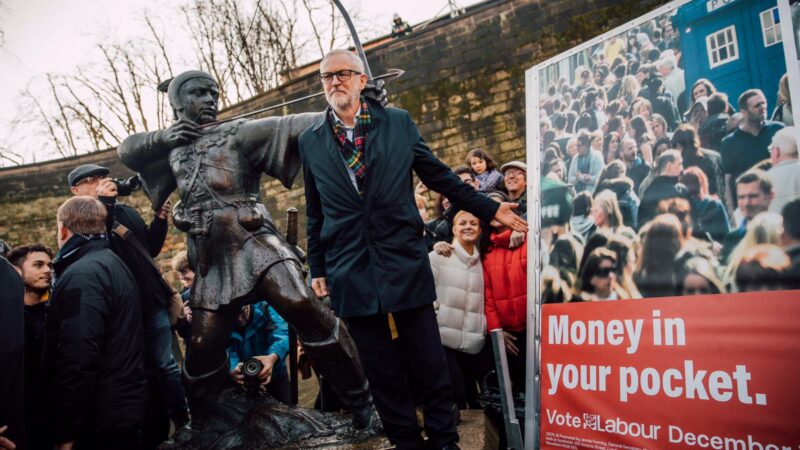
Today, it is ten years since Jeremy Corbyn was elected leader of the Labour Party, with just shy of 60% of the 250,000 votes against second-placed Andy Burnham, a result greeted with a mixture of astonishment, surprise and horror by many of those present. It was the highest proportion of votes won by anyone in a Labour leadership election since ‘One Member One Vote’ (OMOV) elections for leader began – though his result the following year was even higher.
Jeremy Corbyn was a reluctant Leader of the Party, reluctant even as a candidate. He agreed to stand but cautioned me, who had been tasked with getting the nominations he had needed to become a valid candidate, to “make bloody sure I don’t win!” He stood out of a sense of duty, having been persuaded that it was “his turn”.
His first public outing as a candidate (at that stage to get enough nominations to be in the ballot of individual and affiliated members) was at the GMB Congress in Dublin where he received a remarkably good reception on the basis that he gave honest answers to difficult questions. He said what he really thought rather than the cautious and rather evasive responses of the others. He came across like an ordinary, decent bloke (which he is) and he won over many who had started as sceptics.
However, he had to contend with a furious response from the ‘Blairite’ Right within the Labour Party on several issues including Brexit – on which, whatever his personal opinion may have been, he backed remaining in the EU like the overwhelming majority of party members including 80% of Corbyn supporters (based on internal polling).
Corbyn had appointed to the front-bench a team of spokespersons fairly representative of Labour MPs. In June 2016, there occurred what became known as “the chicken coup” when large numbers of front-bench spokespersons – who had never been supporters of Corbyn’s leadership – resigned from the front-bench, destroying draft amendments due to be put to government bills and accompanying notes. Then a ‘soft-left’ delegation asked Corbyn to resign. He refused, whereupon vacancies on the front bench were filled from amongst those willing.
Internal dissent continued with a mass demonstration in Parliament Square called by the Corbyn camp, plus two high-court actions, one to force Corbyn to seek nominations, even though he was the sitting leader ,from opponents of Corbyn; and another to continue to allow new members to vote. After success in the Courts on both counts, he won a second leadership election.
Although Jeremy Corbyn did not win the 2017 general election which followed, he won 12,877,918 votes, 40.0% of the vote, compared with the 13,636,684 votes for the Tories, or 42.3% of the total, a much better result than most commentators predicted. This secured his position as Leader.
That was not the end of Corbyn’s problems, however. There were a growing number of cases of alleged antisemitism being taken through the Labour Party’s disciplinary process. Having sat on disciplinary panels with many such cases myself, I know know just how shocking some of these cases were, often, though not always, involving equating Zionism with Racism. The severity did vary from the very serious cases to ones which arose from ignorance rather than malice and extreme prejudice.
Arguments about definitions were as difficult as those about individual cases. In increasingly toxic and factionalised debates about antisemitism, the divisions between Right and Left became ever more heated. As a pro-Corbyn Jew who took antisemitism very seriously, it became increasingly painful – as it did for Corbyn who was blamed by many for it. Though I think that Jeremy is by no means an antisemite, he took the whole matter personally – which was assisted by opponents who sought to personalise it against him.
But his leadership continued. In 2019, in cold December weather, Jeremy won 10,269,051 votes, or 32.1% of the total, compared with 3,966,454 votes for the Tories on 43.6%. In 2020, Keir Starmer who become leader after the resignation of Jeremy Corbyn, won the general election with 9,708,716 votes, 33.7% of the total.
He did so after a leadership campaign designed to appeal to Corbyn supporters, based on 10 pledges such as increasing income tax for the top 5% of earners (not yet implemented as is also the case with a number other pledges).
Jeremy who has always had a reputation for anti-Racism took criticisms very personally, but also, perhaps because he took it so personally, did not manage his engagement with the issue well. Further, his successor, Keir Starmer, also sought to blame Jeremy personally, including for not taking responsibility for the problem.
In my view this approach factionalised our collective understanding of what had taken place, preventing lessons being properly drawn.




More from LabourList
Antonia Romeo appointed to lead civil service as new Cabinet Secretary
‘If Labour is serious about upskilling Britain, it must mobilise local businesses’
Stella Tsantekidou column: ‘What are we to make of the Labour Together scandal?’